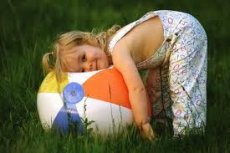New publications
How to keep your child from overheating in the heat?
Last reviewed: 01.07.2025

All iLive content is medically reviewed or fact checked to ensure as much factual accuracy as possible.
We have strict sourcing guidelines and only link to reputable media sites, academic research institutions and, whenever possible, medically peer reviewed studies. Note that the numbers in parentheses ([1], [2], etc.) are clickable links to these studies.
If you feel that any of our content is inaccurate, out-of-date, or otherwise questionable, please select it and press Ctrl + Enter.

Parents know firsthand how hard it is for babies to withstand the heat. How can you make their life easier? The advice is simple but quite effective. The first rule that every mother should follow is not to go for a walk with a baby in the heat. Your time is before 11:00 and after 17:00.
When the body overheats, the following symptoms appear: general weakness, fatigue, headache, dizziness, tinnitus, drowsiness, thirst, nausea, hyperemia (redness) of the skin, increased pulse and breathing, elevated body temperature.
If, when overheated, the child is lethargic, agitated, has impaired consciousness, and sometimes convulsions occur, this indicates that there is a threat to life. In infants, dyspeptic disorders (vomiting, diarrhea) become more frequent, body temperature rises sharply, facial features become more acute, and the general condition quickly deteriorates. If such a child (and in severe cases, an adult) is not given timely emergency care, convulsions, coma, and death may occur.
Stick to this feeding schedule: from 10:00 to 18:00 - more liquid (compotes, teas, fermented milk drinks), and meat, vegetables and porridge - the rest of the time. If you notice signs of overheating in your child - immediately undress him, wipe him with a damp towel, give him some liquid to drink, and then make him a "breeze" with that same towel.
Arrange preventive water procedures. Wipe the smallest 4-5 times a day. To do this, dip a soft terry towel into water (32-35 degrees), wring it out and wipe the arms, legs, tummy and back.
If the room is stuffy and there is no ionizer, humidify the air with a spray bottle and place basins of cold water on high cabinets or hang wet towels around the bed.
A summertime problem for babies is diaper rash. To avoid it, leave your baby naked more often, without a diaper or in cotton panties.
Drink liquid every half hour. Very often children overheat because they do not forget to put on a sun hat, but forget to regularly drink water.
What should a child drink in such heat? Carbonated water, pure water, tea, juice? If a child weighing 25 kg usually drinks up to one and a half liters of liquid per day, then during the heat his body may need twice or even three times more. And the issue of liquid quality becomes of primary importance. After all, a mistake in the choice can lead to the accumulation of unnecessary substances in the child's body.
Choosing water
Nowadays, only extreme sports enthusiasts quench their children's thirst with tap water... Note that the term "tap water" also includes water from grandma's well. Stories about this water being clean are nothing more than a myth!
We will choose water for a child in the store. Sweet soda can be allowed to a child as an exception, but not as a drink that quenches thirst. Need justification? Here you go: orthophosphoric acid, which is contained in sweet carbonated drinks, spoils children's teeth, washes calcium out of the growing body. That is, it deprives the body of building material. And sweeteners, flavors, colorings, stabilizers are a direct path to allergies.
Carbonated mineral water. You can't drink it - it is very aggressive throughout the gastrointestinal tract, and can cause sudden colic in a child. But you need to buy it. For the simple reason that the gas kills germs in the water and the risk of catching some kind of infection is reduced. Release the gas from the water before offering it to the child: leave the glass of water on the table for 15-20 minutes. Mineral water saturated with mineral salts greatly burdens the kidneys and you should drink such water only as prescribed by a doctor. Children under one year of age should not be given mineral water (even without gas)!
The ideal option is table water for children. Not mineral, but table water!
Iced tea is an ideal drink for hiking and picnics. It not only quenches thirst, but also perfectly tones. But it is necessary to limit tea consumption in the afternoon, otherwise the child will not sleep well.
And remember that special teas have been made for children for a long time, without tea leaves. They contain herbs, berries, and fruits that are very useful for children. For example, rosehip tea will provide an additional portion of vitamin C, and a cold drink with apples and mint will calm fidgets a little: mint has a soft calming effect. But in children under 2 years of age, tea prevents iron absorption.
The "kings" of drinks are, of course, fresh juices, fruit drinks, and compotes. To quench your thirst, cherry, plum, and dogwood juices and compotes are best. But don't add a lot of sugar to them.
First aid for overheating should be given in a timely manner. Immediately move the child to the shade, then undress him, put a cool wet napkin on his head and wipe the body with a towel soaked in cool water. Surely, a mother who went on vacation with a child will have antipyretic suppositories in her first aid kit, which must be administered immediately. When the child comes to, give him a cool drink, to which add a pinch of salt per glass of liquid. It is imperative to call a doctor.
By following these rules, you can be sure that your baby will be happy and smiling.
Read also: |
